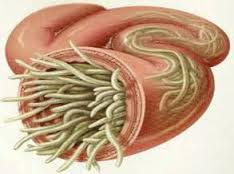
Let's assume that there is an army of parasites ready to lurk in the dog and can be divided into:
Internal parasite infestation is particularly threatening to puppies due to the ease with which it can occur and the complications it can cause. In puppies, worm infestation results directly from mother to fetus via the uterus or through the mother's milk.
In adulthood, however, it originates through the ingestion of eggs, larvae and parasites present in the external environment or through vectors (such as ticks).
It is not easy to immediately notice that the dog is infested: however it is possible to report a series of symptoms, clear detectors of their presence:
-
dull hair
-
anal itching
-
appearance of small worms in freshly emitted stool
-
unmotivated fatigue, loss of appetite
-
unexplained weight loss, diarrhea and vomiting
-
appearance of allergic phenomena
anemia
The worms that can infest your dog belong to two groups:
Round worms come in three different types: roundworms, hookworms and trichiurids